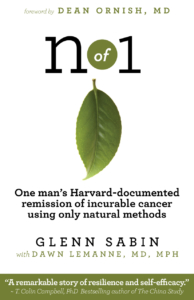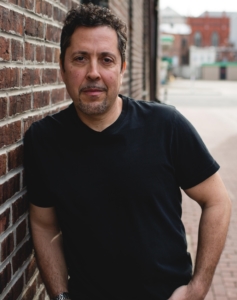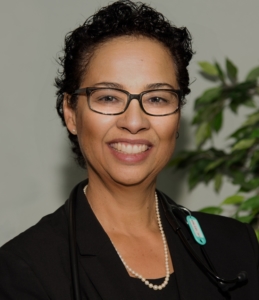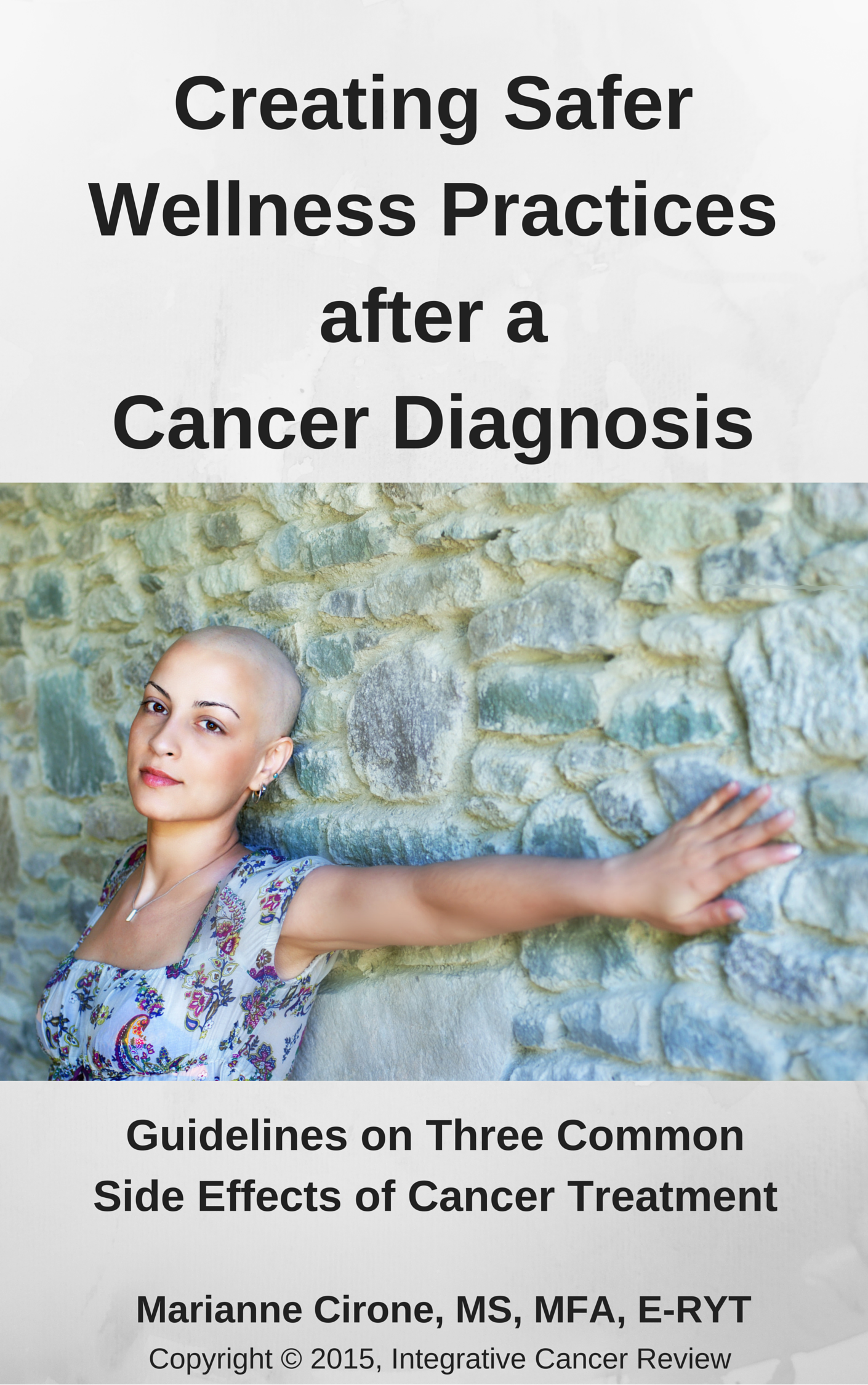
 In 1991, doctors told the active and previously healthy 28-year old Glenn Sabin that he had a “uniformly fatal” form of blood cancer called chronic lymphocytic leukemia (CLL).
In 1991, doctors told the active and previously healthy 28-year old Glenn Sabin that he had a “uniformly fatal” form of blood cancer called chronic lymphocytic leukemia (CLL).
Twenty-six years later, Glenn Sabin is certified cancer-free and has written about his journey to holistic health with co-author, Dawn Lemanne, MD, MPH, in their book, n of 1: One Man’s Harvard-Documented Remission of Incurable Cancer Using Only Natural Methods.
This intimate and moving account shows how intelligence and true grit combined with a lifestyle overhaul can provide the basis for healing against all odds.
 The book n of 1: One Man’s Harvard-Documented Remission of Incurable Cancer Using Only Natural Methods was written by Glenn Sabin and Dawn Lemanne, MD, MPH.
The book n of 1: One Man’s Harvard-Documented Remission of Incurable Cancer Using Only Natural Methods was written by Glenn Sabin and Dawn Lemanne, MD, MPH.
Glenn Sabin is a past board member of The Society for Integrative Oncology and an author, speaker and integrative health consultant. Glenn is a respected thought leader who works with passion and dedication to advance the field of integrative oncology. For more information on n of 1 and Glenn Sabin, go to glennsabin.com.
 Dr. Dawn Lemanne is a practicing oncologist and integrative medicine authority.
Dr. Dawn Lemanne is a practicing oncologist and integrative medicine authority.
One of a small but growing number of oncologists integrating conventional and complementary therapies to treat cancer, Dr. Lemanne approaches each patient as an n of 1. Her practice at Oregon Integrative Oncology, in Ashland, Oregon draws patients from around the globe.
The Journey from Cancer to Wellness
The years between then and now have not been easy, as Glenn chronicles in the book. Yet, his tenacity in using his own life as an experiment – that is, the “n of 1” referring to the sample size of one – has brought Glenn what some would call a miracle.
To be clear, Glenn has sought the guidance of top medical professionals all throughout his journey, including oncologists from Johns Hopkins and Harvard Medical School. Glenn has used some conventional, or allopathic, medicine over the decades of his diagnosis, including a surgery to remove his spleen engorged to seven pounds by leukemia cells, and another to treat the terrible side effects of that surgery, as well as using pharmaceuticals such as antibiotics to treat subsequent infections. However, to clarify, Glenn did not use conventional cancer therapies to treat the actual leukemia – such as chemotherapy, or the bone marrow transplant which was in the early days touted as the key to curing the disease, but which was later indicted as worthless for this condition.
Lifestyle and Nutritional Changes
By his own accounts, when he first got the diagnosis Glenn had been living a hard-driving and stressful Washington, DC area lifestyle, fueled by junk foods and the intense demands of running a media company. When doctors offered him the option of treating the CLL by a “someday” bone marrow transplant or “watchful waiting,” Glenn created a third option: overhauling his entire lifestyle with healthy living choices. Soon he was eating a plant-based, whole food meals lovingly prepared by his steadfast wife, Linda, and in his spare time was studying all he could find out about natural methods for treating cancer. Glenn’s lifestyle changes included taking supplements, trading in sugary drinks for clean water and swapping grueling workouts for meditative exercise. Glenn began to meet with top holistic practitioners for advice with nutritional supplements, while he continued to be checked regularly by conventional physicians to track the progress of the leukemia. While his symptoms cleared, bone marrow biopsies continued to show the presence of leukemia cells.
For years, the leukemia remained at bay, allowing Glenn to lead an active and mostly healthy life, until developed fevers and infections that threatened his life. Tests showed that showed that almost half of his red blood cells were gone, destroyed by his own immune system. This immunological destruction of blood, called hemolytic anemia, is a well-known complication of CLL. Glenn turned down the offered treatments of prednisone or chemotherapy and put together a revised version of his own “home-cobbled” plan of nutraceutical use and exercise, promising to be monitored by his physicians on a regular basis.
Meeting Dr. Keith Block
While Glenn’s intense interest in integrative medicine led him to a professional career in the integrative medicine and to meeting a leading expert in integrative oncology – author of Life Over Cancer, Keith Block, MD – it was a recurrence of Glenn’s leukemia symptoms that eventually led him to Dr. Block’s Illinois office as a patient. The return of Glenn’s CLL symptoms in 2009 coincided with a very high stress time when he was selling his family’s business, and led him to Block Center for Integrative Cancer Treatment. The philosophy of this clinic rested on three pillars of wellness: biography, biology, and pathology, as well as the idea of the tumor “microenvironment.” Dr. Block continued to focus on Glenn’s inflammatory markers and to tweak his integrative protocols, until eventually a bone marrow biopsy in 2012 showed that Glenn was completely cancer-free.
Glenn Sabin’s n of 1 Journey: What it Means for the Field of Medicine
Glenn Sabin has collected a Who’s Who of integrative experts to provide endorsements for his book, and the experts provided comments which are cautiously optimistic, encouraged by Glenn’s results and mostly careful not to jump to conclusions as to what this might mean for other patients. The well-known author Dean Ornish, MD, Founder and President of the Preventive Medicine Research Institute, penned the forward to this book and applauds Glenn’s success with integrative medicine. Dr. Ornish’s comments suggest that lifestyle changes, combined with working with conventional physicians as needed, may be an optimal approach for patients who want to maximize their health benefits are willing to take an active role in their own recovery. Other comments on the book from physicians emphasize the importance of self-advocacy and the importance of each patient’s uniqueness, underscoring the priceless truths of truly personalized medicine.
As Glenn states in his book, “…whole-systems approaches to treatment are here to stay. And they are changing how the world practices medicine. A new clinical approach, integrative medicine, has taken on the duty of ushering into the clinic the next research paradigm, n = 1.
This paradigm rests however, on an old foundation, on an ancient truth, a wisdom known to all true healers, past and present. That wisdom is this: when we are ill and in need of care, we are, each of us, an n of 1.”
















